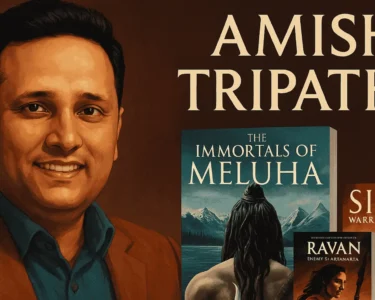Amitav Ghosh: Navigating History, Memory & Empire Through Fiction
Who is Amitav Ghosh

Amitav Ghosh is one of the most celebrated literary voices in the postcolonial world, a master of blending historical truth with fictional imagination. His works traverse continents and centuries, weaving together personal memory, colonial enterprise, migration, and environmental catastrophe into literary epics that resonate globally. Whether writing about 19th-century opium trade or 21st-century climate change, Ghosh’s stories challenge conventional narratives and demand readers to reconsider history itself.
From The Shadow Lines to the ambitious Ibis Trilogy, and more recently The Nutmeg’s Curse, Ghosh’s writing has grown more urgent and politically charged, while maintaining his lyrical storytelling and rigorous research. He has given us characters who walk the margins of empire, empires that collapse under their own contradictions, and a literary universe that connects Bengal with Canton, Cairo with Calcutta, and fiction with anthropology.
This blog explores the biography of Amitav Ghosh, his literary themes, writing style, and the most essential books in his body of work. If you’re a fan of historical fiction, postcolonial studies, or simply great storytelling, Ghosh’s books are not to be missed.
Biography & Career
Amitav Ghosh was born in Calcutta (now Kolkata) in 1956. His father served in the Indian Army, which led to a peripatetic childhood, giving young Ghosh early exposure to diverse regions and cultures. He studied in Delhi, Oxford, and later earned a Ph.D. in social anthropology from Oxford University, where his thesis focused on Egyptian peasant life.
His academic foundation in anthropology and history is evident in his writing, from the ethnographic details in In an Antique Land to the maritime routes traced in the Ibis Trilogy. His debut novel The Circle of Reason (1986) set the tone for a career built on intellectual rigor and narrative complexity.
Ghosh worked as a journalist and researcher before fully devoting himself to fiction. He has taught at various prestigious institutions including Harvard, Columbia, and the University of Delhi. In 2007, he became the first Indian author to receive the Grinzane Cavour Prize in Italy, and in 2018, he was awarded the Jnanpith Award, India’s highest literary honor.
Over the decades, Ghosh’s writing has expanded from postcolonial memory and migration to urgent ecological and geopolitical concerns. He is considered one of the earliest novelists to incorporate climate change as a core narrative force, especially in works like The Great Derangement and Gun Island.
He currently divides his time between Brooklyn, Goa, and other locations, continuing to speak and write on literature, climate justice, and global inequality.
Writing Style & Themes
Amitav Ghosh’s writing style is defined by intellectual precision, historical layering, and a global narrative consciousness. His novels are often panoramic, combining multiple storylines, non-linear timelines, and richly drawn characters across cultures and continents.
His prose style ranges from lush and lyrical to academic and interrogative, reflecting his dual training as a storyteller and scholar. Ghosh frequently integrates archival documents, vernacular phrases, and oral histories, giving his fiction a lived-in texture.
Key Themes:
- Colonialism and Postcolonial Identity (The Glass Palace, Sea of Poppies)
- Migration, Diaspora, and Exile (The Shadow Lines, The Hungry Tide)
- Global Trade and Capitalism (Ibis Trilogy)
- Language, Memory, and History (In an Antique Land)
- Climate Change and Anthropocene (Gun Island, The Great Derangement)
Top 5 Recommended Books by Amitav Ghosh
1. The Shadow Lines (1988)
A semi-autobiographical novel that moves between Calcutta, London, and Dhaka, exploring themes of memory, nationalism, and partition. This novel challenges the concept of borders, both literal and emotional, and remains a staple in Indian literature syllabi. A must-read for understanding Ghosh’s early voice and philosophical inquiry.
Why it matters: It redefines the personal as political through stunning prose.
2. The Hungry Tide (2004)
Set in the Sundarbans of eastern India, this novel follows an unlikely trio, a marine biologist, a translator, and a fisherman, as they navigate ecological threats and cultural divides. Ghosh blends myth, science, and displacement into a haunting narrative.
Why it matters: It marked Ghosh’s deeper engagement with environmental literature.
3. Sea of Poppies (2008)
The first book in the Ibis Trilogy, this historical epic is set against the backdrop of the First Opium War and follows a diverse cast on a ship bound for Mauritius. Ghosh invents a sea language (lascar creole) and builds a world of indenture, empire, and resistance.
Why it matters: It’s Ghosh’s most ambitious work of historical fiction and was shortlisted for the Booker Prize.
4. In an Antique Land (1992)
A hybrid of memoir, travelogue, and historical narrative, this book recounts Ghosh’s research in Egypt and medieval Indian Ocean trade routes. It questions Eurocentric history and shows how fiction and anthropology can blend.
Why it matters: It blurs boundaries between genres, cultures, and centuries.
5. Gun Island (2019)
In this genre-defying novel, Ghosh addresses climate change, migration, and mythology. From Bengal to Venice to Los Angeles, the story follows a rare book dealer whose life unravels as he encounters displaced communities and ecological chaos.
Why it matters: It brings climate fiction into the literary mainstream, a theme central to Ghosh’s late-career activism.
Legacy & Cultural Impact
Amitav Ghosh is more than a novelist, he’s a chronicler of forgotten histories, a voice for the displaced, and a literary activist. His work challenges the way we remember empires, tell stories, and confront ecological collapse.
Ghosh’s books are taught in literature, history, and environmental studies courses around the world. He has elevated Indian English fiction to a global stage without sacrificing cultural specificity.
He remains one of the few novelists equally revered by critics, academics, and general readers. Through his fiction and non-fiction alike, Ghosh has shaped 21st-century literature’s response to the past, and the planetary future.
FAQ About Amitav Ghosh
- Is Amitav Ghosh a historian? He’s a novelist with a Ph.D. in anthropology, known for rigorous historical research.
- Where should I start reading him? , Try The Shadow Lines or Sea of Poppies depending on your preference for contemporary vs. historical fiction.
- Has he won major awards? , Yes, including the Jnanpith Award and India’s Sahitya Akademi Award.
Timeline of Major Works
- 1986 – The Circle of Reason
- 1988 – The Shadow Lines
- 1992 – In an Antique Land
- 2000 – The Glass Palace
- 2004 – The Hungry Tide
- 2008–2015 – The Ibis Trilogy (Sea of Poppies, River of Smoke, Flood of Fire)
- 2016 – The Great Derangement (non-fiction)
- 2019 – Gun Island
- 2021 – The Nutmeg’s Curse (non-fiction)
Amitav Ghosh continues to reshape what literature can do, inviting us to re-examine history, question the costs of progress, and imagine a world more conscious of its interdependencies. His characters don’t just belong to the past; they speak to the moral and ecological dilemmas of our present.
📚 Have you read Amitav Ghosh’s work? Which novel resonated with you most?
Tell us in the comments, or tag @thebookdate with your thoughts or shelf photos.
At TheBookDate, we celebrate authors like Ghosh who bridge fact and fiction, East and West, past and future. Join us for more curated reading lists, literary deep-dives, and author features that help you explore the stories shaping our world.





